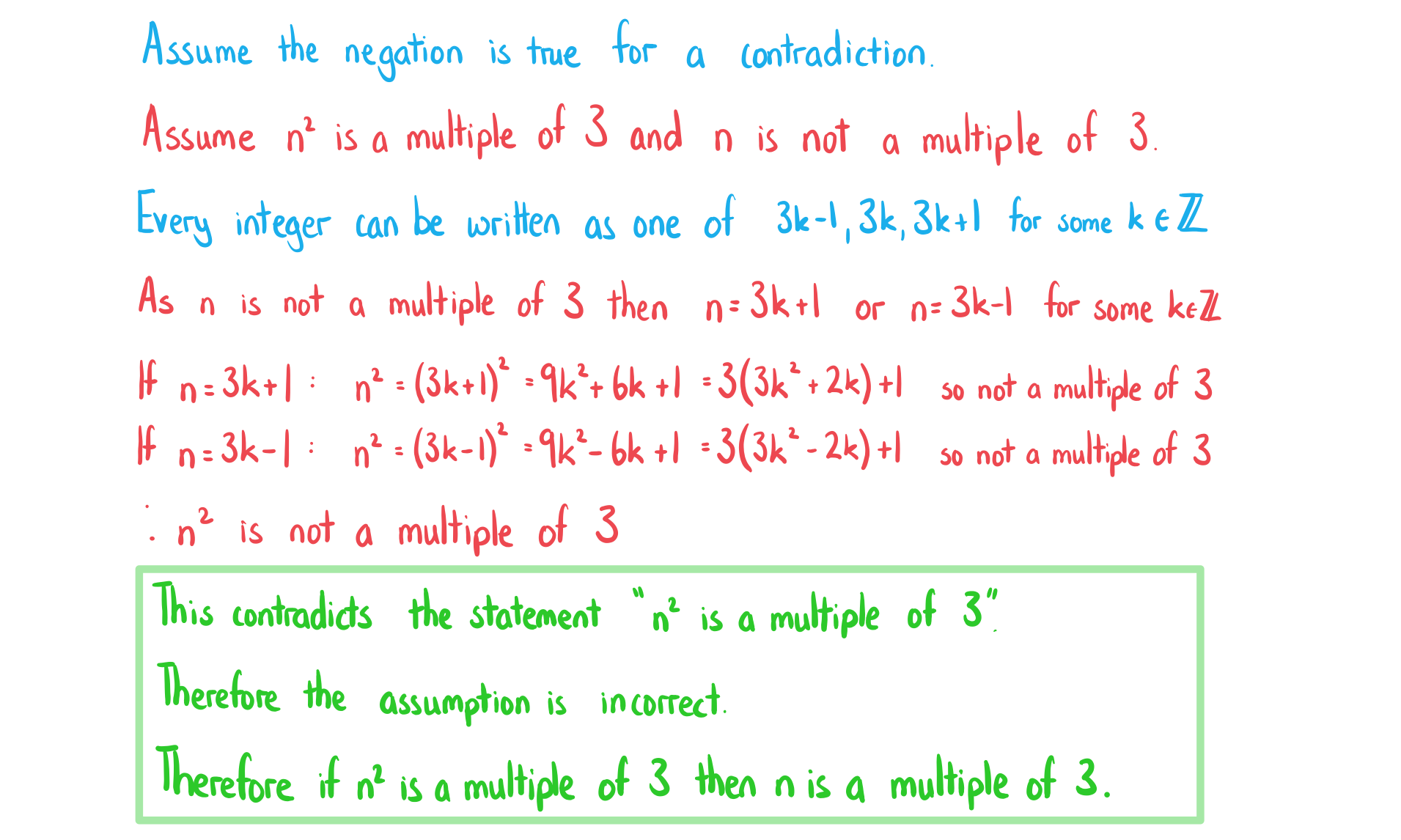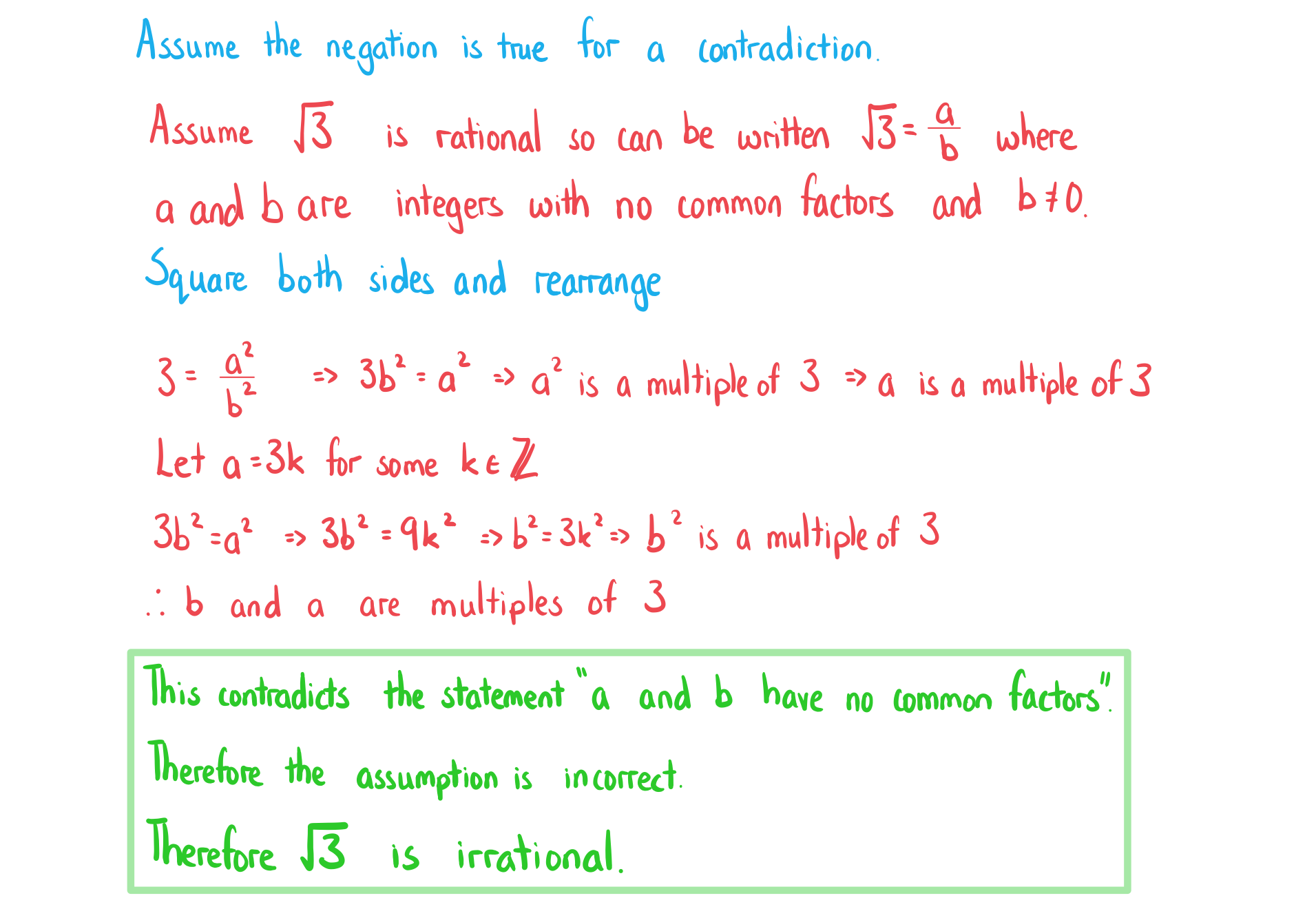Proof by Contradiction
What is proof by contradiction?
- Proof by contradiction is a way of proving a result is true by showing that the negation can not be true
- It is done by:
- Assuming the negation (opposite) of the result is true
- Showing that this then leads to a contradiction
How do I determine the negation of a statement?
- The negation of a statement is the opposite
- It is the statement that makes the original statement false
- To negate statements that mention “all”, “every”, “and” “both”:
- Replace these phrases with “there is at least one”, “or” or “there exists” and include the opposite
- To negate statements that mention “there is at least one”, “or” or “there exists”:
- Replace these phrases with “all”, “every”, “and” or “both” and include the opposite
- To negate a statement with “if A occurs then B occurs”:
- Replace with “A occurs and the negation of B occurs”
- Examples include:
|
Statement |
Negation |
|
a is rational |
a is irrational |
|
every even number bigger than 2 can be written as the sum of two primes |
there exists an even number bigger than 2 which cannot be written as a sum of two primes |
|
n is even and prime |
n is not even or n is not prime |
|
there is at least one odd perfect number |
all perfect numbers are even |
|
n is a multiple of 5 or a multiple of 3 |
n is not a multiple of 5 and n is not a multiple of 3 |
|
if n² is even then n is even |
n² is even and n is odd |
What are the steps for proof by contradiction?
- STEP 1: Assume the negation of the statement is true
- You assume it is true but then try to prove your assumption is wrong
- For example: To prove that there is no smallest positive number you start by assuming there is a smallest positive number called a
- You assume it is true but then try to prove your assumption is wrong
- STEP 2: Find two results which contradict each other
- Use algebra to help with this
- Consider how a contradiction might arise
- For example: ½a is positive and it is smaller than a which contradicts that a was the smallest positive number
- STEP 3: Explain why the original statement is true
- In your explanation mention:
- The negation can’t be true as it led to a contradiction
- Therefore the original statement must be true
- In your explanation mention:
What type of statements might I be asked to prove by contradiction?
- Irrational numbers
- To show
is irrational where p is a prime
- Assume
where a & b are integers with no common factors and b ≠ 0
- Use algebra to show that p is a factor of both a & b
- To show that
is irrational where p & q are different primes
- Assume
where a & b are integers with no common factors and b ≠ 0
- Use algebra to show qb = pa
- To show that a or b must be irrational if their sum or product is irrational
- Assume a & b are rational and write as fractions
- Show that a + b or ab is rational
- Prime numbers
- To show a polynomial is never prime
- Assume that it is prime
- Show there is at least one factor that cannot equal 1
- To show that there is an infinite number of prime numbers
- Assume there are n primes p1, p2, ..., pn
- Show that
is a prime that is bigger than the n primes
- Odds and evens
- To show that n is even if n² is even
- Assume n² is even and n is odd
- Show that n² is odd
- Maximum and minimum values
- To show that there is no maximum multiple of 3
- Assume there is a maximum multiple of 3 called a
- Multiply a by 3
Exam Tip
- A question won't always state that you should use proof by contradiction, you will need to recognise that it is the correct method to use
- There will only be two options (e.g. a number is rational or irrational)
- Contradiction is often used when no other proof seems reasonable
Worked Example
Prove the following statements by contradiction.
a)
For any integer  , if
, if  is a multiple of 3 then
is a multiple of 3 then  is a multiple of 3.
is a multiple of 3.

b)

